The Russian president has approved a National Anti-Corruption Plan every two years since 2008 and considers that struggle one of his top law enforcement priorities. Most agencies from the police to the courts publish separate statistical reports charting corruption-related crimes. However, 80 percent of all bribery convictions in 2014 involved sums of no more than 10,000 ($162) rubles, according to the judicial department of the Supreme Court.
What's more, the average size of the bribes in those cases fell from 7,500 rubles in 2011 to 2,500 rubles in 2013. That means half of all cases involved sums even lower than those figures. This indicates that the authorities are pursuing increasingly trivial bribery cases.
At the same time, the number of serious bribery cases seems to be on the rise, especially when the bribes are part of illegal actions. The number of defendants in such cases rose 5.5 times, from 934 in 2012 to 5,119 in 2014 even while the number of people charged with committing minor acts of corruption fell by two-thirds.
This would seem like a positive sign indicating that the authorities have finally begun going after, if not major acts of corruption, then at least deliberately illegal actions and civil servants who take bribes to perform their duties.
However, this trend is probably not due to law enforcement agencies focusing on the more dangerous forms of corruption, but the Supreme Court issuing a broader interpretation in 2013 of what constitutes a bribe in connection with illegal activity. Now that definition includes any departure from the entire scope of powers an official holds, as well as any procedural violation, even if the action in question is legitimate — such as issuing a license in accordance with established criteria.
This over-regulation means that the authorities can find violations in almost everything that civil servants perform. As a result, what was previously considered a minor offense carrying a maximum prison sentence of 2-3 years now qualifies as a more serious crime of corruption.
The reason for the growth in the number of cases of bribery for the commission of unlawful acts is that the Interior Ministry only considers serious and very serious corruption cases as a measure of their regional offices' level of activity — and fully 84 percent of all corruption cases are handled by the ministry. As a result, such crimes are considered "serious" regardless of the size of the bribe involved, and reflect positively on police officers' performance.
Since mid-2011, officials have kept separate statistics for bribes of from 25,000 to 150,000 rubles ($405 to $2,428), considering them a serious crime and allowing police officers to count them as part of their fight against corruption.
However, priority is given to identifying and bringing to trial minor bribery cases, making it unlikely the authorities will make greater efforts to pursue more serious violations. In fact, judicial department data shows that the courts look at only 100 to 110 cases involving large bribes each year in all of Russia, while the focus remains on small bribes.
And now, with a little legislative sleight of hand, those minor offenses count as serious crimes — enabling officials to report greater accomplishments without any additional effort.
Anna Razogreyeva is an associate professor of Criminal Law and Criminology at the Southern Federal University in Rostov-on-Don. Irina Chetverikova is a junior research fellow at the Law Enforcement Institute of the European University in St. Petersburg. This comment originally appeared in Vedomosti.
A Message from The Moscow Times:
Dear readers,
We are facing unprecedented challenges. Russia's Prosecutor General's Office has designated The Moscow Times as an "undesirable" organization, criminalizing our work and putting our staff at risk of prosecution. This follows our earlier unjust labeling as a "foreign agent."
These actions are direct attempts to silence independent journalism in Russia. The authorities claim our work "discredits the decisions of the Russian leadership." We see things differently: we strive to provide accurate, unbiased reporting on Russia.
We, the journalists of The Moscow Times, refuse to be silenced. But to continue our work, we need your help.
Your support, no matter how small, makes a world of difference. If you can, please support us monthly starting from just $2. It's quick to set up, and every contribution makes a significant impact.
By supporting The Moscow Times, you're defending open, independent journalism in the face of repression. Thank you for standing with us.
Remind me later.


